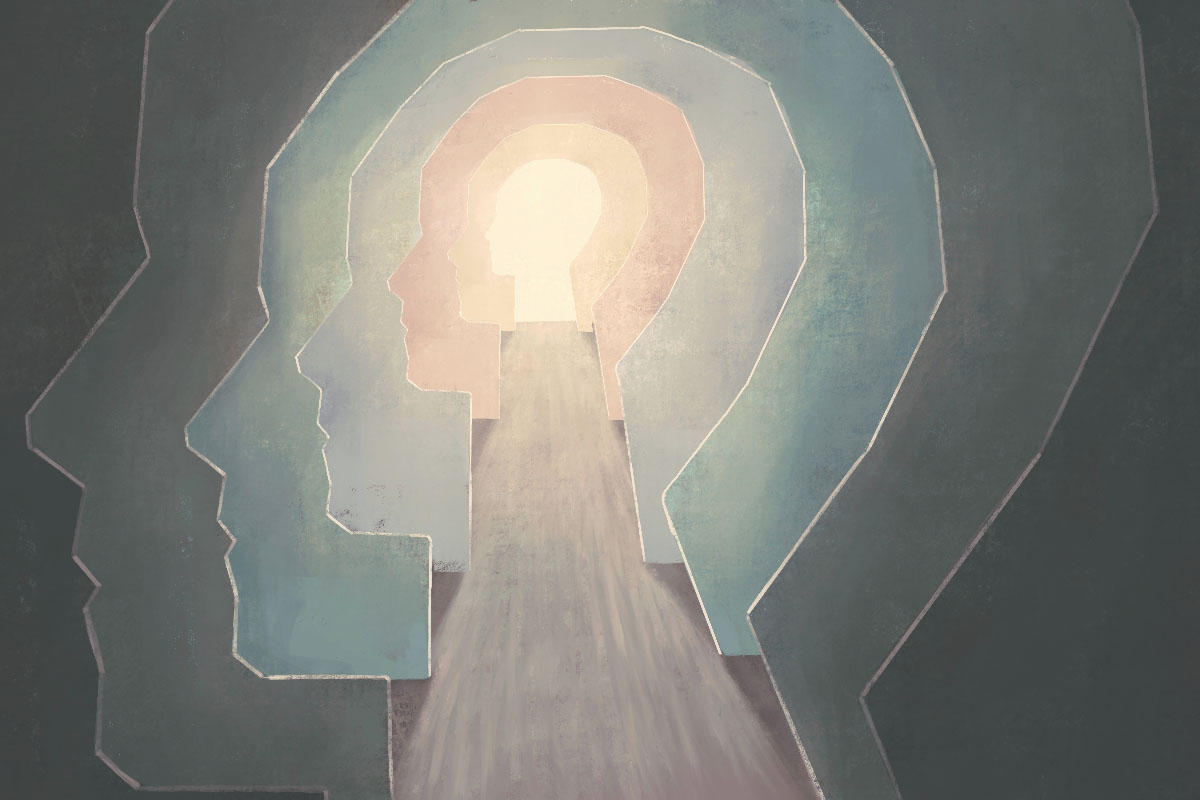
Are you being authentic, or are you often an imposter?Are you being true to yourself, or are you often wearing a mask? How do you break through any disempowering facades and awaken your most empowered and authentic you?
When you meet someone in a social setting and raise their position above your own through some degree of subjective judgment and a biased perception and admire them or even become infatuated with them and put them on a pedestal, through comparison, you will simultaneously tend to minimize yourself. And you will be too humble to admit that what you perceive in them lies equally within you.
Also, when you meet someone in a social setting and lower their position below your own through some degree of subjective judgment and a biased perception and despise them or even become resentful to them and put them in the pit, through comparison, you will simultaneously tend to exaggerate yourself. And you will be too proud to admit that what you perceive in them lies equally within you.
But ultimately, if you look within and more deeply reflect on your own behavior, you will discover that what you perceive in another individual also lies equally within yourself. I have demonstrated this equative reflective principle for nearly four decades in well over 100,000 individuals around the world.

“You, therefore, have no excuse, you who pass judgment on someone else, for at whatever point you judge another, you are condemning yourself, because you who pass judgment do the same things.” Romans 2:1
“If you point a finger at someone, three fingers are pointing back at you.” Unknown
Nearly four decades ago, I went page by page through the large Oxford English Dictionary and underlined every word that described an expression of human behavior. I discovered 2,314 individual behaviors along with their complementary opposite antonyms—totaling 4,628 in all. Examples included: kind and cruel, nice and mean, honest and dishonest, generous and stingy, peaceful and warful, considerate and inconsiderate, gentle and harsh, positive and negative, etc. . .
When I deeply and honestly reflected on my life over this two-year period of lexical inquiry, I discovered that I displayed or demonstrated every one of those behaviors and their opposites at different times and places in my life and with different individuals many times. Nothing was missing in me, although initially, I was too humble or too proud to want to admit it. And initially, I unconsciously distracted myself from being willing to perceive a full or equitable reflection. But, with further introspection, I eventually discovered that what I perceived in them also equitably existed within me.
When you exaggerate or minimize the behaviors of others and put them on pedestals or pits and admire or despise them, it is partly because you are not fully perceiving these same behaviors in yourself to the same degree. You are being deflective in your awareness and are blind, unconscious or ignorant about portions of yourself, as well as of them.

And when you exaggerate or minimize another individual in a way that is not who they truly and actually are, it is not their authentic or whole self. It is a projection of your disowned parts onto them. They actually have equally both sides of the behavioral equation as do you. In a day, a week, a month, or a year or longer, you will probably discover that your initial perception of them was incomplete and partially blinded and subjectively biased to some degree or another. As you exaggerate or minimize them, you, in turn, minimize or exaggerate yourself through comparison, which also keeps you from recognizing your whole and authentic self.
Whenever you judge, or more accurately, misjudge another individual, you, in turn, judge or misjudge yourself, just as you do when you compare the temperatures of three basins of cold, moderate and hot water. When you place your hand into a basin of cold 40˚F water and then place it into a basin of 72˚F water, it, by comparison, will subjectively feel even warmer than 72˚ F. When you place your hand into a basin of hot 140˚F water and then place it into a basin of 72˚F water, it, by comparison, will subjectively feel even cooler than 72˚ F.
Whenever you misjudge yourself due to such comparisons, you play the role of the imposter and wear a mask or put on a facade. Your imposter persona can be any corresponding exaggerated or minimized expression of some portion of yourself.
When you admire or are infatuated with another individual, it is because you are more conscious of their positive behaviors and less conscious or unconscious of their negative behaviors. You have a subjective confirmation bias on their positives and a subjective disconfirmation bias on their negatives, or a false positive on their positives and a false negative on their negative behaviors.
When you despise or resent another individual it is because you are more conscious of their negative behaviors and less conscious or unconscious of their positive behaviors. You have a subjective confirmation bias on their negatives and a subjective disconfirmation bias on their positives, or a false positive on their negatives and a false negative on their positive behaviors.
The projected label of positive or negative behaviors is only a relative description based upon whether they are perceived to be supportive or challenging to your unique hierarchy of values. It is not actually who they are, it is only who you subjectively perceive them to be in that moment. This subjectively biased, perceptual distortion of another individual and the corresponding one within yourself can occur in one or many of the seven primary areas of life—Mental, Vocational, Financial, Familial, Social, Physical and Spiritual.

When you look up to someone who you assume is more mentally, vocationally, financially, familially, socially, physically or spiritually achieving than you, and, in turn, minimize your mental, vocational, financial, familial, social, physical or spiritual achievements with respect to them, you distract yourself from your state of authenticity with your self-depreciating humble shame. This humble persona tends to set too small of goals in too long a period of time to “repurpose” you upward and return you back to your more self-loving authenticity.
When you look down on someone who you assume is less mentally, vocationally, financially, familially, socially, physically or spiritually achieving than you and, in turn, exaggerate your mental, vocational, financial, familial, social, physical or spiritual achievements with respect to them, you distract yourself from your state of authenticity with your self-aggrandizing arrogant pride. This proud persona tends to set too large of goals in too short a period of time to “depurpose” you downward and return you back to your more self-loving authenticity.
In essence, when you put another individual on a pedestal, you put yourself in the pit. And when you put another individual in the pit, you put yourself on a pedestal. Just as you can have physical body dysmorphia when you compare yourself to another individual physically, you can have other forms of “dysmorphia” in each of the seven areas of life when you exaggerate or minimize others and minimize and exaggerate yourself in turn.
So how do you break through and transform such inauthentic states of being? By identifying what is truly highest on your unique list of values, planning and prioritizing your daily actions, and remaining focused on fulfilling these actions until they are completed. This brings blood, glucose and oxygen to your forebrain’s executive center which awakens a more balanced, neutral, objective or less subjectively biased and judgmental view of others and yourself and stabilizes your mind with more equanimity and equity.
Next, begin asking yourself quality questions that awaken your unconscious mind to make you fully conscious through reflective and more balanced awareness.
First ask yourself:
“What specific behavior do I perceive this individual displaying or demonstrating that I like and admire, or dislike and despise first most, second most, third most . . .?”
Then ask yourself:
“Go to a moment where and when I have perceived myself displaying or demonstrating the same behavior? Where was it? When was it? Who did I display or demonstrate the behavior to? Who perceived me doing so? Keep asking these two questions until you realize you, too, display or demonstrate all of the same behaviors 100 percent to the same degree—quantitatively and qualitatively.

Do this for each behavior you admire or despise in them and, in turn, minimize or exaggerate in you until all of them are accounted for equitably. This will level the playing field and bring your mind into a state of equanimity within and your relationship with them into equity without. This is the state where you maximize sustainable fair exchange in your transactions because the playing field is leveled.
Each individual expresses each behavior according to their own unique set of values, and they each express them to the same degree—although your brain’s subcortical amygdala wants you to avoid facing this great, yet often overlooked, truth.
When you keep asking these two questions and identify within yourself whatever you perceive in another individual and you level the playing field, you awaken, once they are equal, your authentic self. You are then neither too ashamed nor too proud to admit whatever you perceive in them—within yourself.
When you perceive equity between another individual and yourself—you masterfully awaken equanimity within yourself. You become fully conscious instead of conscious and unconsciously biased. You become objectively loving instead of subjectively judging. You become poised and present instead of impulsively seeking and instinctively avoiding. You are now able to love them, as well as yourself now, for who you both are.
It is this more masterful reflective awareness that empowers your state of authenticity and results in a sustainable state of fair exchange in each of the seven areas of life.
Dr John Demartini is an international best-selling author, educator and business consultant.

